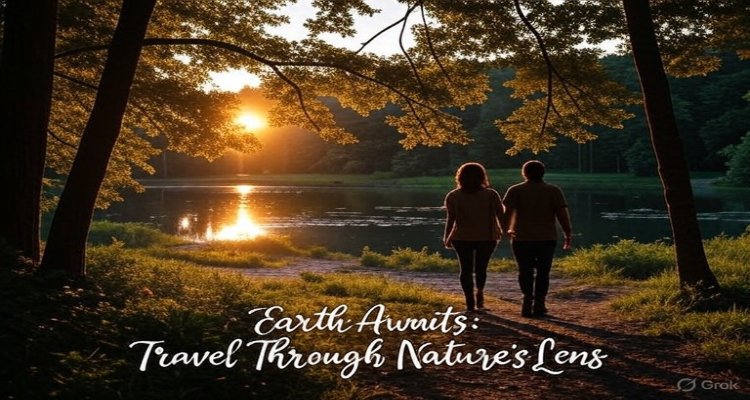Planet Earth Awaits: Travel Through Nature’s Lens
Discover how nature-inspired travel is transforming global tourism, reconnecting people with Earth’s beauty while shaping sustainable journeys.
Introduction: A World Waiting Beyond the Screen
In an age dominated by glowing screens and virtual escapes, the call of the wild has never felt stronger. More travelers today are choosing to experience the planet not through digital filters but through the raw lens of nature itself. From misty mountain trails in the Andes to the unbroken silence of Arctic tundras, nature-driven travel is redefining how we see Planet Earth.
Context & Background: A Return to the Natural World
Tourism has always been shaped by human curiosity. Ancient civilizations journeyed across deserts, oceans, and forests in search of trade, knowledge, or spiritual meaning. But in the modern era, mass tourism shifted toward cities, resorts, and curated experiences.
Now, climate concerns, ecological awareness, and post-pandemic reflection have sparked a new wave: immersive nature tourism. According to the United Nations World Tourism Organization (UNWTO), sustainable and eco-tourism are among the fastest-growing travel segments, with millions seeking experiences that go beyond sightseeing.
Main Developments: Traveling Through Nature’s Lens
This shift is not about simply “visiting” nature but about seeing the world through its lens—immersing in ecosystems, respecting biodiversity, and slowing down to observe.
- Wildlife-Centric Journeys: From safaris in Botswana to birdwatching in Costa Rica, travelers are prioritizing encounters that highlight conservation efforts.
- Eco-Trekking & Trails: Trails like Spain’s Camino de Santiago or Peru’s Inca routes are drawing visitors who want both physical challenge and spiritual connection.
- Oceanic Exploration: With coral reefs threatened by warming seas, diving tourism in destinations like Australia and the Maldives is increasingly tied to reef preservation initiatives.
- Forest Immersion: Practices like Shinrin-yoku (forest bathing) in Japan have inspired global movements, emphasizing mental wellness through nature travel.
Such experiences represent not just tourism, but an evolving mindset: Earth is not merely a backdrop—it is the protagonist.
Expert Insight & Public Sentiment
Environmentalists argue that this transformation is both timely and urgent.
“Tourism has long been seen as extractive, but nature-focused travel has the potential to be regenerative,” says Dr. Amara Patel, an ecotourism researcher at Oxford University. “It creates awareness and encourages travelers to become advocates for the planet they explore.”
Travelers themselves echo this sentiment. Online communities brim with stories of “life-changing” hikes, silent retreats in natural reserves, and conservation volunteering trips. These experiences are less about luxury and more about authentic connection.
Impact & Implications: A Turning Point for Tourism
The rise of nature-centered travel carries powerful implications:
- For Local Communities: Eco-tourism generates sustainable income while protecting cultural heritage and biodiversity.
- For the Environment: Managed responsibly, it funds conservation and reduces the footprint of mass tourism.
- For Global Tourism: This trend may shift the industry from volume-driven to value-driven, focusing on preservation rather than exploitation.
However, challenges remain. Overtourism in fragile ecosystems—such as Mount Everest or certain national parks—shows how even “nature tourism” can become destructive without regulation.
Conclusion: A Call to Travelers
Planet Earth is not an infinite resource but a shared home with boundaries. As more travelers trade crowded cityscapes for natural horizons, the future of tourism will depend on balance—between exploration and preservation, awe and responsibility.
The message is clear: Planet Earth awaits, but it awaits with conditions. Travel lightly, see deeply, and let nature—not convenience—set the lens.
Disclaimer : This article is intended for informational and educational purposes. It does not endorse specific travel companies or guarantee environmental outcomes. Travelers should research local guidelines and practice responsible tourism.











